Bisultanov Gives Denmark GR Gold, Two Repeat as Euro Champs at #WrestleDortmund
Saturday, July 3, 2021 - 16:09 By Vinay Siwach

DORTMUND, Germany (July 3) --- The last time a Greco-Roman wrestler from Denmark became a junior European champion, he went to became a World and Olympic silver medalist. That was Mark MADSEN (DEN).
17 years after Madsen won the junior title, Turpal BISULTANOV (DEN) achieved the same feat with a stunning run at the junior European Championships in Dortmund, Germany on Saturday.
The former cadet world bronze medalist overcame challenges from fellow cadet world medalist including two-time silver medalist and cadet European champ Muhammad EVLOEV (RUS) in the semifinals.
In the final at 87kg, Bisultanov faced Gabriel LUPASCO (MDA), a cadet world silver medalist had no answers to the Danish wrestler's pressure for the entire six minutes. After being warned for passivity, Lupasco gave up a point for push out and trailed 0-2.
Bisultanov up the ante with a takedown in the danger zone to lead 4-0. The call was challenged by Moldova alleging a leg foul from the Dane. But they lost the challenge, giving Bisultanov another point. Another takedown improved the score to 7-0 and he kept the lead until the clock expired.
The 20-year-old had finished fifth at his debut senior European Championships in April this year, and said that the experience will help him get better as he continues to improve.
Lupasco may not have been able to win the gold but his compatriot and another briskly improving wrestler Alexandrin GUTU (MDA) captured the gold medal at 77kg.
 Alexandrin GUTU (MDA) won the junior Euro title at 77kg. (Photo: UWW / Kadir Caliskan)
Alexandrin GUTU (MDA) won the junior Euro title at 77kg. (Photo: UWW / Kadir Caliskan)
The former cadet World and European champion faced Giorgi SHPETISHVILI (GEO) in the final. The Georgian was a 71kg bronze medalist at the 2018 cadet Worlds, in which Gutu won gold. The two had clashed in the 1/8 finals in Croatia with Gutu defeating Shpetishvili via fall.
Exactly two years later, history repeated itself as Gutu handed Shpetishvili another defeated via fall to win the 77kg gold medal in Dortmund.
The two were tied 3-3 after the first period and it looked like Shpetishvili will not meet the same fate but Gutu, who won the gold at Youth Olympics in 2018, claimed five more points in the second period before getting the pin.
Gutu, a bronze medalist at the Individual World Cup, outscored his opponents 39-10 with wins in semifinal and final via fall.
Two defend titles
 Muhammet BAKIR (TUR) defended his 130kg title in Dortmund. (Photo: UWW / Kadir Caliskan)
Muhammet BAKIR (TUR) defended his 130kg title in Dortmund. (Photo: UWW / Kadir Caliskan)
At 130kg, Muhammet BAKIR (TUR) repeated by winning the gold medal against Mykhailo VYSHNYVETSKYI (UKR). The cadet world champion held on to a 3-1 win against the Ukrainian to defended his European title.
In the opening round, Bakir was awarded a point for Vyshnybetskyi's passivity and he performed a gut wrench from the par terre position, leading 3-0 at the break.
The Ukrainian also got a point for Bakir's passivity in the second period but he could not take any advantage from the par terre position, giving the Turk the win.
Bakir gave up only three points in his four bouts in Dortmund, outscoring his opponents 25-3 on his way to the gold medal.
Diego CHKHIKVADZE (GEO) was the second wrestler who defended his title, having won the 2019 gold at 60kg.
 Diego CHKHIKVADZE (GEO) collects four points with a throw against Gurban GURBANOV (AZE) (Photo: UWW / Kadir Caliskan)
Diego CHKHIKVADZE (GEO) collects four points with a throw against Gurban GURBANOV (AZE) (Photo: UWW / Kadir Caliskan)
He met Gurban GURBANOV (AZE) in the 63kg final on Saturday and beat him 8-1 to win the gold medal. His aggressive wrestling gave Gurbanov little time to adjust and secured himself the top medal.
Opening up with an over-the-shoulder throw, Chkhikvadze made his intentions clear early on. Gurbanov was awarded a point for reversal but the lead remained with the Georgian.
Gurbanov, a former cadet world champion at 42kg, was then called for passivity which made the score 3-1 in Chkhikvadze's favour. From par terre, the Georgian came up with a huge throw and led 7-1. Azerbaijan challenged the call but lost, losing another point.
Chkhikvadze's run in Dortmund saw him hand U23 European silver medalist Niklas OEHLEN (SWE) suffer a 3-1 defeat before the Georgian humbled wrestlers from Russia and France.
Gerogia could have had two champions on Saturday but Pavel BELKIN (RUS) defeated Giorgi TOKHADZE (GEO) to spoil there party at 55kg.
It was a match that finished in quick time as Belkin performed a stunning body lift throw on Tokhadze to win 8-0 in just one minute and six seconds.
Tokhadze began with a head-pinch when Belkin was applying pressure but could not get the exposure, leading to Belkin ending up on top. The referees gave four points for that but Georgia challenged and won. The score was revised as 2-0 for Russia.
The Georgian again initiated an attack up a scramble saw him give up points. Continuing the takedown, Belkin lifted the Georgian for four-point throw, ending the match. A visibly stunned Tokhadze took time to recollect before walking back to the center.
Wrestling on the final day of the Championships will see the medal bouts of the remaining five Greco-Roman weight categories – 60kg, 67kg, 72kg, 82kg and 97kg – in Dortmund.
 Pavel BELKIN (RUS) celebrates after winning the 55kg gold in Dortmund. (Photo: UWW / Kadir Caliskan)
Pavel BELKIN (RUS) celebrates after winning the 55kg gold in Dortmund. (Photo: UWW / Kadir Caliskan)
RESULTS GR
55kg
GOLD: Pavel BELKIN (RUS) df Giorgi TOKHADZE (GEO), 8-0
BRONZE: Denis DEMIROV (BUL) df Muhammet CAKIR (TUR), via inj. def.
BRONZE: Denis MIHAI (ROU) df Garnik HOVHANNISYAN (ARM), 9-2
63kg
GOLD: Diego CHKHIKVADZE (GEO) df Gurban GURBANOV (AZE), 8-1
BRONZE: Corneliu RUSU (MDA) df Ilia MUSTAKOV (BUL), 4-3
BRONZE: Niklas OEHLEN (SWE) df Yanis NIFRI (FRA), 3-2
77kg
GOLD: Alexandrin GUTU (MDA) df Giorgi SHPETISHVILI (GEO), via fall
BRONZE: Exauce MUKUBU (NOR) df Yuksel SARICICEK (TUR), 5-3
BRONZE: Jonni SARKKINEN (FIN) df David ZHYTOMYRSKY (ISR), 11-0
87kg
GOLD: Turpal BISULTANOV (DEN) df Gabriel LUPASCO (MDA), 7-0
BRONZE: Algot KAELLMAN (SWE) df Patrik MEZEI (HUN), 7-0
BRONZE: Muhammad EVLOEV (RUS) df Dzmitry SALAUYANAU (BLR), 9-0
130kg
GOLD: Muhammet BAKIR (TUR) df Mykhailo VYSHNYVETSKYI (UKR), 3-1
BRONZE: Tomasz WAWRZYNCZYK (POL) df Nikolaos NTOUNIAS (GRE), 7-6
BRONZE: Adolf BAZSO (HUN) df Albert VARDANYAN (ARM), 1-1

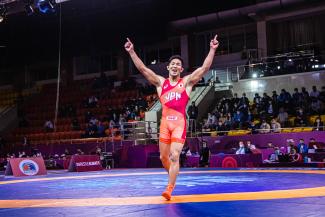
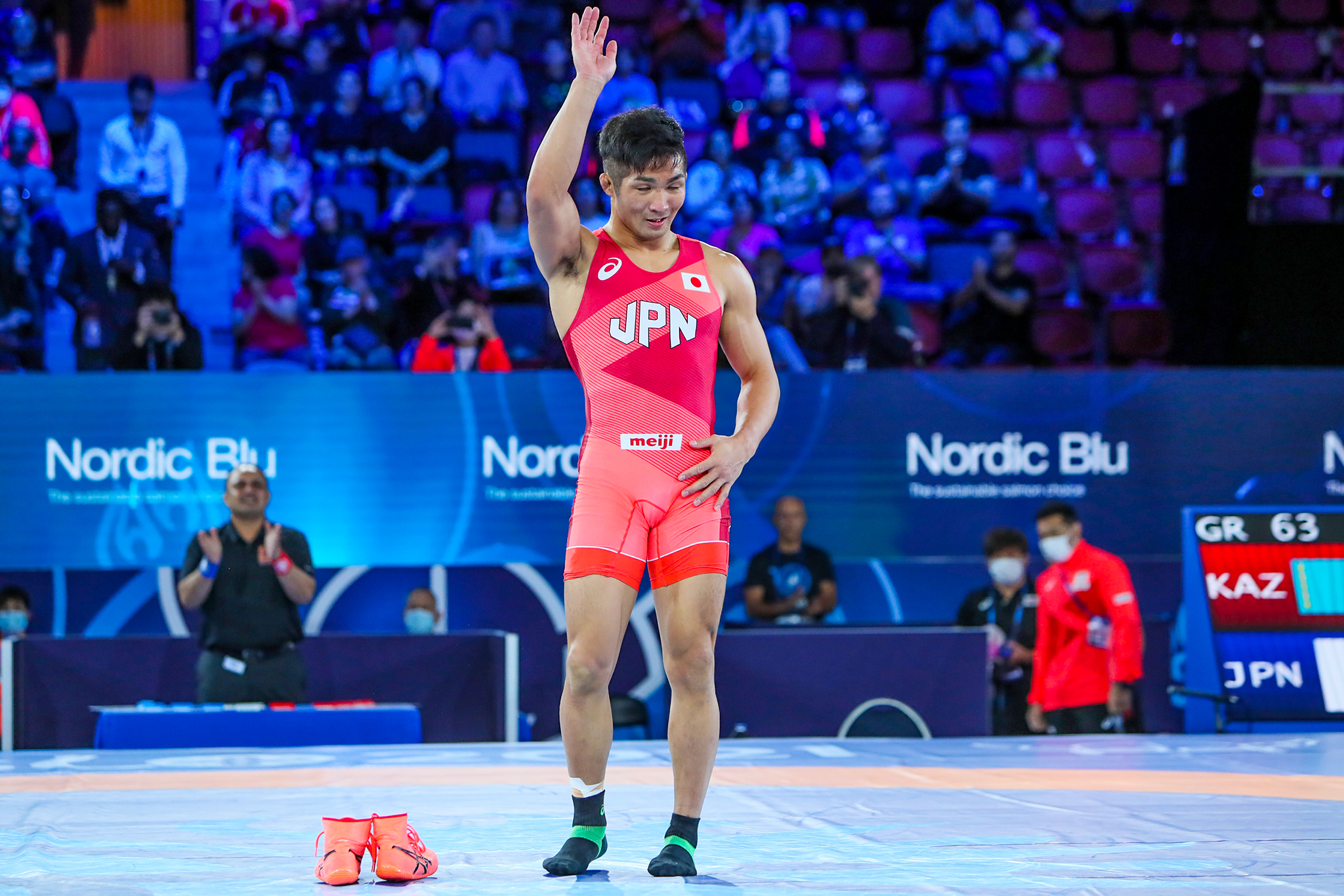 Tsuchika SHIMOYAMADA (AUS) had left his shoes on the mat during the 2021 World Championships to mark his retirement. (Photo: United World Wrestling / Martin Gabor)
Tsuchika SHIMOYAMADA (AUS) had left his shoes on the mat during the 2021 World Championships to mark his retirement. (Photo: United World Wrestling / Martin Gabor)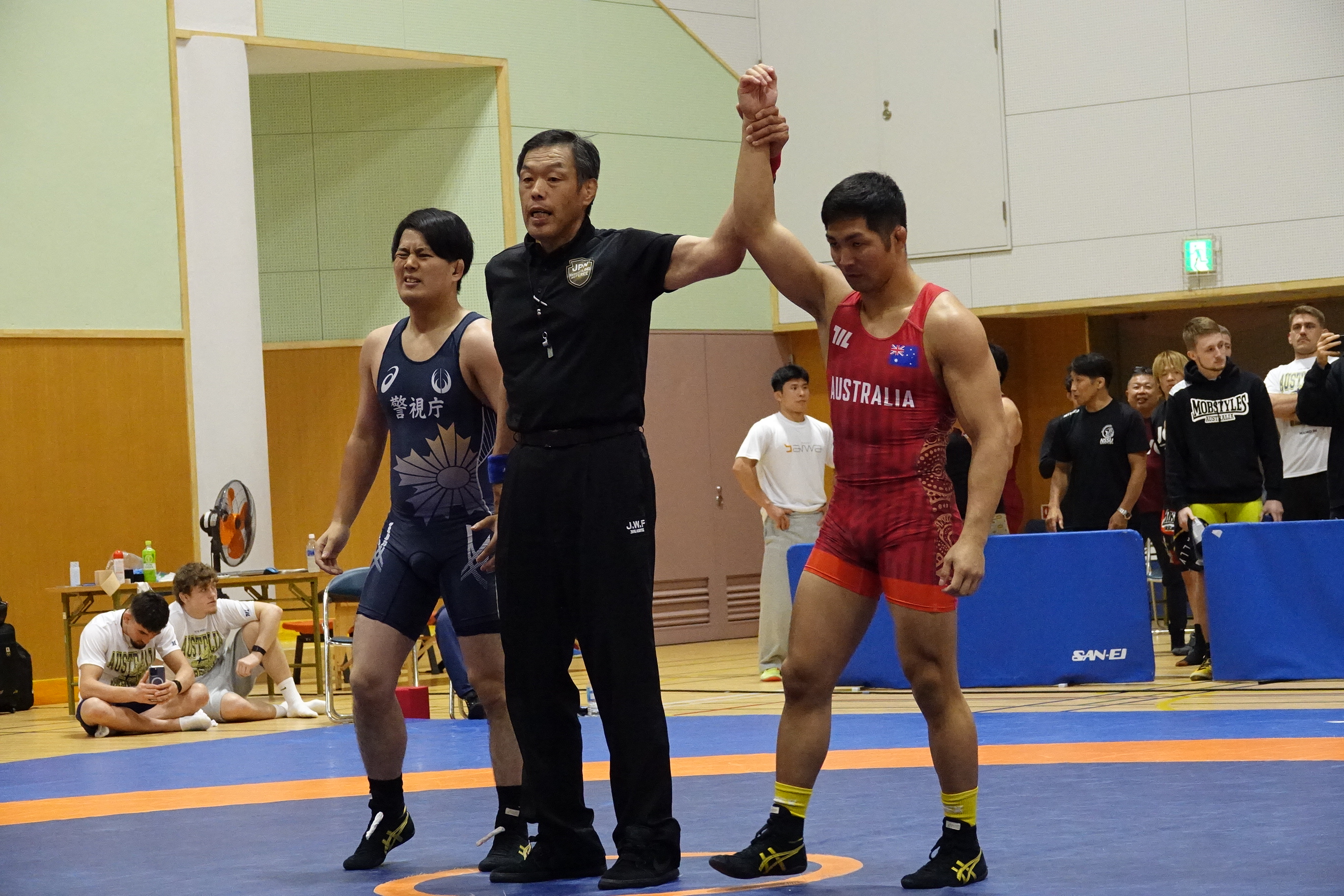 Tsuchika SHIMOYAMADA advances to the semifinals at the All-Japan Non-Student Championships in July with a 52-second win over Kokoro GOTO. (Photo: Koji Fuse / wrestling-spirits.jp)
Tsuchika SHIMOYAMADA advances to the semifinals at the All-Japan Non-Student Championships in July with a 52-second win over Kokoro GOTO. (Photo: Koji Fuse / wrestling-spirits.jp)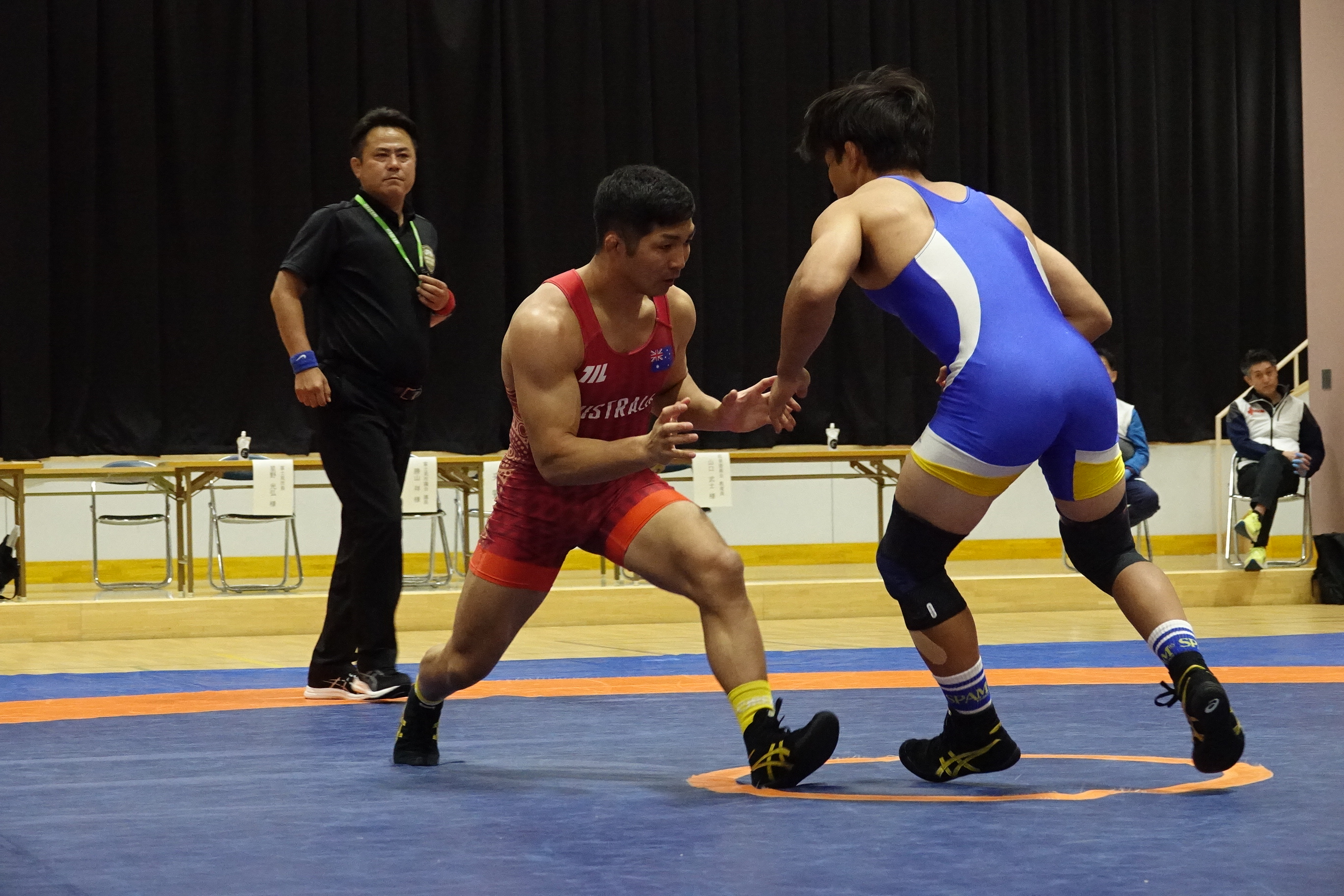 Tsuchika SHIMOYAMA faces Keitaro ONO in his opening match at the All-Japan Non-Student Championships in July. (Photo: Koji Fuse / wrestling-spirits.jp)
Tsuchika SHIMOYAMA faces Keitaro ONO in his opening match at the All-Japan Non-Student Championships in July. (Photo: Koji Fuse / wrestling-spirits.jp)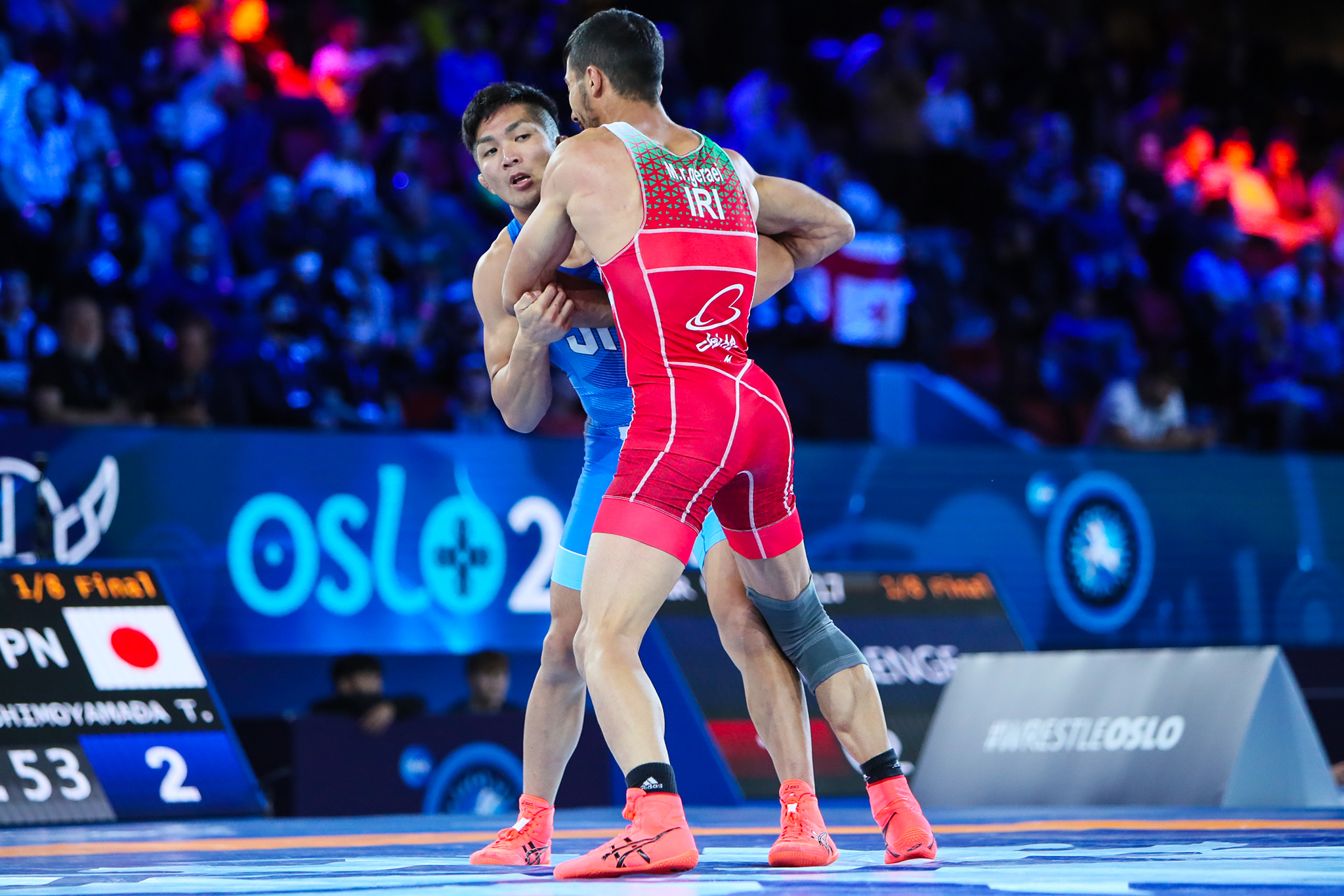 Tsuchika SHIMOYAMADA (AUS) was dominating Mohammadreza GERAEI (IRI) in their match at the 2021 World Championships before being pinned. (Photo: United World Wrestling / Martin Gabor)
Tsuchika SHIMOYAMADA (AUS) was dominating Mohammadreza GERAEI (IRI) in their match at the 2021 World Championships before being pinned. (Photo: United World Wrestling / Martin Gabor)
Share your thoughts.
Comments